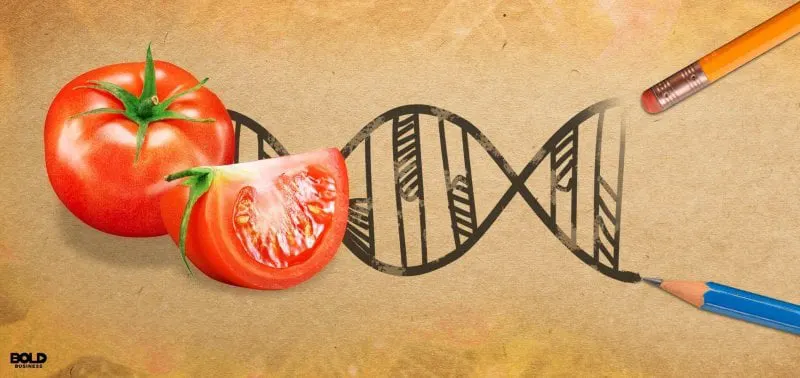Video: Tired of tasteless tomatoes? A juicier, faster-growing genetically-engineered breed is on the horizon
Video: Tired of tasteless tomatoes? A juicier, faster-growing genetically-engineered breed is on the horizon


Scientists at the University of Oxford’s Department of Plant Sciences have discovered how the overall process of fruit ripening in tomato (including colour changes and softening) can be changed -speeded up or slowed down – by modifying the expression of a single protein located in subcellular organelles called the plastids. This offers a novel opportunity for crop improvement.
The production of fruit is a vital process for plants because it enables them to reproduce and thrive. One strategy that plants use to ensure that their fruit are successful is to give them a colourful appearance, so that they are attractive to animals for seed dispersal.
In tomato, the fruit ripening process involves dramatic changes in tiny “organelles” inside the fruit cells called plastids. It is these plastids that are responsible for giving colour to the fruit.
In spite of their central importance in delivering fruit colour, surprisingly little was known about how plastids participate in the ripening process.
The regulatory properties of SP1 revealed in our study show that it has real potential as a technology for crop improvement
The Oxford team has now discovered a function in fruit for a protein located in the plastids called SP1 (this SP1 protein controls a regulatory pathway called CHLORAD, which was discovered by the group in 2019). The new finding reveals an important regulatory or controlling role for plastids in the fruit ripening process in tomato.
Significantly, the results published [May 18] in Nature Plants provide a theoretical basis for the modification or manipulation of the ripening of fleshy fruits such as tomato, providing a novel opportunity for crop improvement.
Corresponding author, Professor Paul Jarvis from Oxford’s Department of Plant Sciences, said: ‘The regulatory properties of SP1 revealed in our study show that it has real potential as a technology for crop improvement. For example, it could be used to develop early or late fruiting varieties of fleshy fruits, or to improve the transportability or shelf-life of fruit by delaying ripening without compromising the quality of the ripe fruit.
‘It’s fascinating that the amount of a single protein in these tiny subcellular structures called plastids can have such far-reaching consequences for fruit ripening in tomato.’
The work is based on the modification of the expression of the tomato SP1 gene (as well as the related tomato SPL2 gene) in transgenic tomato plants. Transgenic plants with reduced or elevated levels of expression of SP1 were studied in detail, using a range of techniques including phenotyping, electron microscopy, gene expression analysis, and metabolomics.
Read the original post

 | Videos | More... |

Video: Nuclear energy will destroy us? Global warming is an existential threat? Chemicals are massacring bees? Donate to the Green Industrial Complex!
 | Bees & Pollinators | More... |

GLP podcast: Science journalism is a mess. Here’s how to fix it

Mosquito massacre: Can we safely tackle malaria with a CRISPR gene drive?

Are we facing an ‘Insect Apocalypse’ caused by ‘intensive, industrial’ farming and agricultural chemicals? The media say yes; Science says ‘no’
 | Infographics | More... |

Infographic: Global regulatory and health research agencies on whether glyphosate causes cancer
 | GMO FAQs | More... |

Why is there controversy over GMO foods but not GMO drugs?

How are GMOs labeled around the world?

How does genetic engineering differ from conventional breeding?
 | GLP Profiles | More... |

Alex Jones: Right-wing conspiracy theorist stokes fear of GMOs, pesticides to sell ‘health supplements’




 Trust issues: What happens when therapists use ChatGPT?
Trust issues: What happens when therapists use ChatGPT? Fighting deforestation with CO2: Biotechnology breakthrough creates sustainable palm oil alternative for cosmetics
Fighting deforestation with CO2: Biotechnology breakthrough creates sustainable palm oil alternative for cosmetics Viewpoint — Fact checking MAHA mythmakers: How wellness influencers and RFK, Jr. undermine American science and health
Viewpoint — Fact checking MAHA mythmakers: How wellness influencers and RFK, Jr. undermine American science and health Viewpoint: Video — Big Solar is gobbling up productive agricultural land and hurting farmers yet providing little energy or sustainabilty gains
Viewpoint: Video — Big Solar is gobbling up productive agricultural land and hurting farmers yet providing little energy or sustainabilty gains California, Washington, Oregon forge immunization alliance to safeguard vaccine access against federal undermining
California, Washington, Oregon forge immunization alliance to safeguard vaccine access against federal undermining 30-year-old tomato line shows genetic resistance to devastating virus
30-year-old tomato line shows genetic resistance to devastating virus The free-range chicken dilemma: Better for birds, but with substantial costs
The free-range chicken dilemma: Better for birds, but with substantial costs ‘You have to treat the brain first’: Rethinking chronic pain with Sanjay Gupta
‘You have to treat the brain first’: Rethinking chronic pain with Sanjay Gupta
